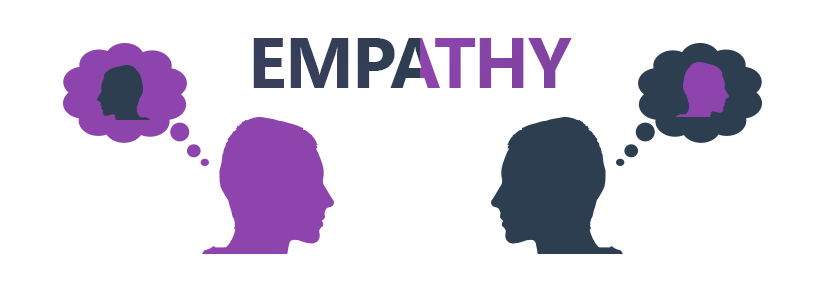An empath is someone who picks up on other peoples’ energy. All humans are wired to be empaths. Some of us know we are, some don’t. Some know how to manage it, some don’t. That’s the only difference.
Take the classic example – you’re thinking about someone and then they call you. You’re both picking up on each other’s energy, the desire to talk to each other. Coincidence? There are no coincidences. It’s called being an empath.
Another example – the minute your friend answers the phone you can hear in her voice something isn’t right – she’s tired, upset, frustrated etc. That’s picking up another person’s energy. We can all do it. We often don’t know we’re doing it, but we can all do it.
Can You Put Yourself in Their Shoes?
Empathy, on the other hand, is the ability to put yourself in someone else’s shoes, to feel their struggle or joy, to feel for them.
It’s possible to pick up someone else’s energy, knowing they’re not in a good mood, but not “feel for them.”
Example – you call a friend and can instantly tell they’re not in a great mood. You can note it, ignore it and keep talking. Or you can feel it and give them some empathy by asking how they are, relating to them, asking how you can help them.
In one scenario you can feel their energy but do nothing with it. In the second scenario you feel their energy and let them know you feel it. Just by acknowledging, you are having empathy. “Hey, I can sense something is up. Want to talk about it?” or “I can tell you’re frustrated, would you like some help?”
Do you see the difference?
It’s Possible to be an Empath but Not Empathetic
There is no right or wrong here; I wanted to point out the difference. Just because you may realize you are an empath, doesn’t mean you have empathy for the other person. They are not mutually exclusive. You can be one without the other.
We all get busy or excited or focused on what we want to say and sometimes forget to be empathetic to the other person. Sure, that happens. Sometimes we forget. As a general rule, though, it makes for better relationships if we remember to be empathetic to others.
As I mentioned at the beginning, all humans are empaths. But not all humans are empathetic. That’s something you are either born with or can learn.
Empathy Can be Learned
Remember EQ we talked about in a former blog post? Emotional intelligence quotient. It was a popular buzzword in the 1990s. Some people can be great but don’t have a clue how to treat others because they lack empathy. The good news is, it can be learned. That’s what all those books on EQ were about – how to learn empathy. If you don’t have it, you can get it. It’s a matter of tuning in and paying attention.
Since you’re already an empath by default as a human, you are picking up on the other person’s energy. Now what do you do with it? That’s the bigger question. People will react friendlier and nicer to you if you are empathetic because you’re not ignoring their feelings. You don’t have to agree with them, just acknowledge them.
Some people, I realize, don’t want to discuss their feelings or state of mind. That’s ok. You’ll know who they are. If you know people like that, they don’t want their mood acknowledged, so don’t bring it up. Let them be.
Most people, though, appreciate being acknowledged. It’s human nature.
Think about customer service, one of the hardest jobs in the world, in my opinion. If you call a company all upset and the customer service person ignores your feelings, how does that make you feel? You might continue to get angry until they acknowledge them. Or you might not care as long as they solve your problem.
The best customer service reps, in my opinion, are the ones that acknowledge that you’re upset and take care of the problem. By letting you know that they know you’re upset helps them too because it’s an attempt to calm you down. Even though it’s their job and they get paid to do it, I’d bet they don’t really like dealing with the angry callers. Who would? So, getting you to calm down is a win/win for you both. They don’t have to sit through your rants and you are acknowledged for being upset.
Empathy Validates Us
It goes back to validation. I talked about that in a former post. Validation is one of our greatest, if not the greatest, human need. When babies are born it’s natural for mothers to stare into their baby’s eyes. It’s acknowledging to the baby that they are alive and are a separate entity. They exist. Numerous studies have proven that babies that don’t get much eye contact tend to grow up with emotional problems. Why? Because not looking at them almost implies they don’t exist. Who wants to feel that way? If you were ever ignored, even once, you know what I mean.
Being ignored or ghosted is one of the most hurtful experiences we humans can have because it’s basically telling us we don’t exist. Or that we aren’t valuable enough to be shown or told we exist.
Displaying empathy shows the other person not only do they exist, but “I get you.” I know how you feel, I can feel you, I feel your feelings, I can relate to you and I want to be nice to you, help you, calm you down etc.
Next time you talk to someone and pick up on their state of mind, take it a step further and show empathy for them if it’s appropriate. As I said earlier, know your audience. Some people may find it invasive or not want to talk about it. Or maybe they’re just not in the mood to discuss it now. In that case you’ve acknowledged, “Hey, I noticed something’s up” and then leave it right there. You’ll know if you can go further and offer to talk about it. Just by offering you are showing empathy.
The best bosses are the ones that let their employees know they care about them and their feelings. The same can be said about friends and family members. The people we like the most are often the ones who show they care about us by being empathetic.
How to be Empathetic
If you’re not sure how to be empathetic there are tons of resources. Just google it. To teach you would require more than a few sentences here. Here’s a rule of thumb. Tune into the other person’s energy. If you’re not sure how to do that, then practice it. Once you’ve tuned in it’s as simple as acknowledging you notice they’re feeling such and such a way. Then, depending on the person, take it a step further and offer to help. Helping can look a lot of ways. Solutions will present themselves when you listen.
It’s often said, “It’s not what you know, but who you know.” Knowing a lot of people doesn’t equate to success. However, being empathetic with people can go a long way towards a successful life both personally and professionally.






